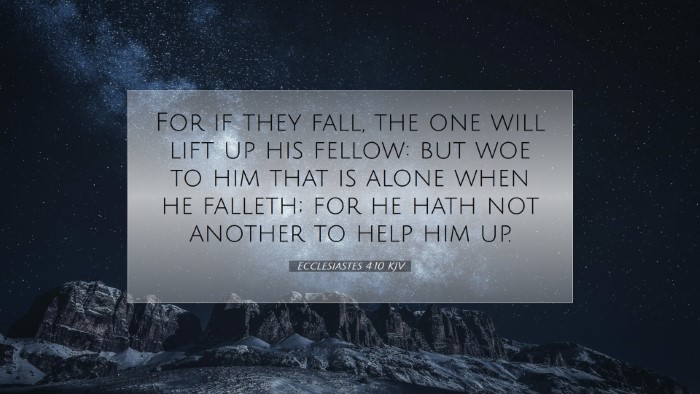Old Testament
Genesis Exodus Leviticus Numbers Deuteronomy Joshua Judges Ruth 1 Samuel 2 Samuel 1 Kings 2 Kings 1 Chronicles 2 Chronicles Ezra Nehemiah Esther Job Psalms Proverbs Ecclesiastes Song of Solomon Isaiah Jeremiah Lamentations Ezekiel Daniel Hosea Joel Amos Obadiah Jonah Micah Nahum Habakkuk Zephaniah Haggai Zechariah MalachiEcclesiastes 4:10
Ecclesiastes 4:10 KJV
For if they fall, the one will lift up his fellow: but woe to him that is alone when he falleth; for he hath not another to help him up.
Ecclesiastes 4:10 Bible Commentary
Ecclesiastes 4:10 Commentary
Verse Reference: Ecclesiastes 4:10 - "For if they fall, one will lift up his fellow: but woe to him that is alone when he falleth; for he hath not another to help him up."
Introduction
Ecclesiastes 4:10 presents a profound truth about the nature of companionship and the human experience. This verse emphasizes the importance of community and support in living a meaningful life. Through the combined insights of Matthew Henry, Albert Barnes, and Adam Clarke, we explore the multifaceted dimensions of this verse.
Exegesis of Ecclesiastes 4:10
The verse encapsulates various themes—the necessity of companionship, the vulnerability of solitude, and the inherent value of mutual support.
1. The Necessity of Companionship
Matthew Henry highlights that human beings are inherently social creatures. God created humanity for fellowship, and the experience of falling down provides a metaphor for life’s struggles. In a world filled with trials, having someone by our side is invaluable.
Albert Barnes elaborates on this notion by asserting that companionship is both a source of strength and an essential motivator. When we face adversities, having a friend can inspire hope and resilience. The pictures of helping one another reflect the biblical principle of bearing one another's burdens (Galatians 6:2).
Adam Clarke adds that the phrase "one will lift up his fellow" underscores the proactive role we are to play in others' lives. It serves as a call to be attentive and responsive to the needs of those around us.
2. The Vulnerability of Solitude
Matthew Henry warns against the perils of isolation. The verse’s reference to "woe to him that is alone" reminds us that solitude can lead to despair, especially during times of hardship. He posits that God designed human interaction as a protective measure against life's trials.
Albert Barnes articulates that being alone at a moment of falling not only signifies physical separation but also emotional and spiritual loneliness. This reinforces the idea that isolation can deepen our struggles, making it crucial for believers to foster community.
Adam Clarke amplifies the concern for solitude by emphasizing that those who do not invest in relationships are left vulnerable. Clarke suggests that the absence of a support system can lead to a greater magnitude of suffering when faced with life’s adversities.
3. The Value of Mutual Support
The latter part of the verse emphasizes the rewarding nature of mutual assistance. Matthew Henry states that mutual support breathes life into human existence. He points out that we are encouraged to extend help, drawing on the classic biblical teaching of love and service towards one another.
Albert Barnes notes that there is a divine wisdom in the design of companionship, which allows for individuals to lift each other when one stumbles. This cooperation reflects the larger theological truth that the church functions as a body with many members, where each is vital to the whole (1 Corinthians 12:12-27).
Adam Clarke correlates this verse with the teachings of Jesus, emphasizing the importance of love and support among believers. He suggests that our ability to help and be helped is a reflection of the Christian life. Through our relationships, we mirror the grace and mercy of God.
Theological Implications
In unpacking Ecclesiastes 4:10, it becomes evident that the theological implications stretch beyond personal relationships. The communal aspect of faith is essential to the health of both individuals and the wider church.
Matthew Henry posits that Christian fellowship is paramount to spiritual growth and perseverance. The mutual accountability found in relationships helps believers stay rooted in their faith.
Albert Barnes emphasizes that the church’s mission includes uplifting its members. This verse serves as a reminder of our responsibility to foster a culture of support and encouragement within our congregations.
Adam Clarke draws on the fact that the act of lifting others is not merely a social or psychological action but a profound spiritual act that honors God's design for humanity. It illustrates the need for Christians to embody Christ's love in practical ways.
Practical Applications
The wisdom of Ecclesiastes 4:10 prompts several practical applications for pastors, students, theologians, and Bible scholars:
- Encouraging Community: Foster small group ministries that allow individuals to connect deeply and support one another in times of need.
- Creating Supportive Environments: Develop church programs aimed at mentoring and educating members on providing emotional and spiritual care.
- Promoting Accountability: Encourage individuals to find accountability partners who can lovingly point out struggles and lend a hand during difficult times.
- Performing Acts of Service: Organize outreach programs that enable members to serve and lift others, reflecting the love of Christ in action.
Conclusion
Ecclesiastes 4:10 serves as a poignant reminder of the critical role that companionship plays in our lives. In a world where isolation can often feel profound, this verse champions the cause of community, urging believers to invest in relationships that foster support and resilience. Drawing from the insights of Matthew Henry, Albert Barnes, and Adam Clarke, we are reminded of the rich theological truths embedded in this scripture and the timeless relevance it holds for our daily lives.


